このコラムでは、複数回にわたりBE*hiveの展示内容をご紹介しています。
今回ご紹介するのは、第3期の展示を活用した「ロヒンギャ難民ワークショップ」です。
11月20日、聖心女子大学4号館にあるBE*hive(ビーハイブ)で同大学の学生向けに「ロヒンギャ難民ワークショップ」を行いました(講師:伊藤容子/開発教育協会スタッフ)。
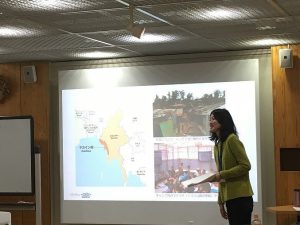
学生たちにロヒンギャ難民が発生した背景について説明する伊藤スタッフ
●アイスブレイク ~難民クイズ~
まず始めに、難民問題やロヒンギャ難民に関する4択クイズで、頭と体をほぐしました。なぜ体もほぐれるのかというと、下の写真のようにスペースの4隅にそれぞれクイズの答えの選択肢を書いておき、自分がそうだと思う答えの場所へ移動しなければならないからです。昼過ぎの授業には、眠気覚ましの良い運動になりました。
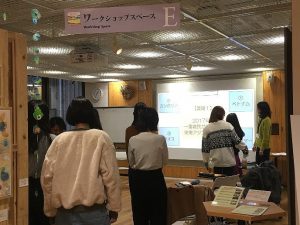
ロヒンギャ難民が発生した背景については、少し複雑です。それを知るためには、彼らの出身であるミャンマー・ラカイン州の歴史、彼らの宗教、国籍法など多方面の理解が不可欠です。そのため、講師が簡単に解説をした後、参加した学生たちにはBE*hiveの展示をみて、更にロヒンギャ難民についての理解を深めてもらいました。
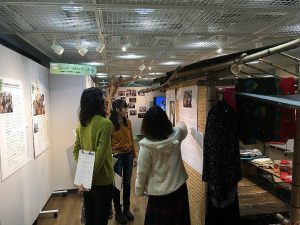
展示パネルに書かれてあることについて話をする伊藤スタッフ(左)と学生たち
●ミニワークショップ ~ロヒンギャ難民に関する様々な意見を読み比べる~
次に、新聞やネットに書かれたロヒンギャ難民に関する記事、各種報道におけるコメントなどを抜粋したものをもとに、ロヒンギャ難民に関する意見交換を行いました。いくつかの記事(意見)について、自分がもっとも共感できるもの・受け入れがたいものを選び、その理由も含めて3~4人のグループで話をしました。自分と異なる他の人の意見に驚きながらも、その違いを興味深いこととして受けとめる学生も多かったようです。
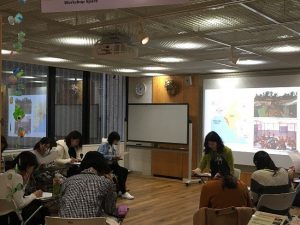
学生の感想の一部をご紹介します。
・ロヒンギャ難民問題に関するコメントを様々な立場の人々からの意見で知ることができました。重大な問題として語っていてもどこか人まかせな部分もあったり、感じ方によって身勝手と思ったり、簡単に答えがでないということを実感しました。
・総じて、他人事として考えてはいけないなと感じました。ワークショップをする前は、ロヒンギャという単語すら知らなかったので、今回知ることができて良かったです。1つの班の意見であった、皆がアウンサン・スーチーに頼りすぎであり、一人ひとりが自分たちのこととして考えるべきという意見はとても共感しました。
●展示コーナーの見学 ~世界の難民の現状を知る~
最後に、ロヒンギャ難民がどのような困難に立ち向かい、難民キャンプや日本でどのような生活を送っているかを知るためにBE*hiveの展示を見学しました。展示を通じて、新聞記事では見えづらかった「難民と呼ばれる人たち」について、具体的なイメージを持つことができたのではないかと思います。
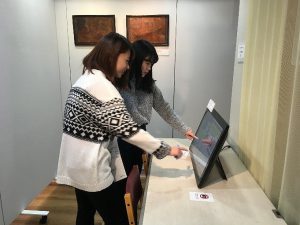
タッチパネルを使って写真データを見る学生
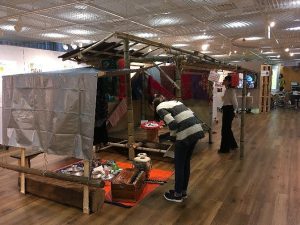
バングラデシュや難民キャンプ内にある再現されたお茶屋(チャドカン)を覗く学生
展示の見学を終えた後、印象深かったところ、展示から受け取ったメッセージ、疑問や知りたいことなどワークシートへ記入しました。何人かの学生の感想を一部、ご紹介します。
授業に参加した学生の感想(一部)
・「難民が人間らしく暮らしていく」という言葉が印象に残りました。
・「ロヒンギャ難民」というひとくくりで考えるより、難民キャンプにいる子供たち1人1人の写真を見てから考えた方が、遠い他人事としてとらえていた感覚が薄れていきました。また、「ロヒンギャ難民」について様々な立場からのコメントを読んだ際、自分はどういう立場なのか、ということを考えさせられた。
・「難民にされないロヒンギャ」が印象に残りました。バングラデシュでは、難民の地位に関する条約に入っていないため、逃げてきた難民たちは難民あつかいされないという事実に驚きました。人としての自由を奪われた現状を知りました。
・ロヒンギャの事を今回初めて知りましたが、人権も保護されず、難民としてバングラデシュに逃げても難民扱いされない現状にとてもショックを受けました。
・難民であっても楽しいや嬉しいという感情を持ち、家族を大切にする心があるのだと知りました。難民という状況を経験したからこそできる事はあると思います。自分の経験を武器にできる人が現れれば、難民に対するイメージが変わるのではないかと思いました。
「知り・考え・行動する」という視点で様々な参加型ワークショップをBE*hiveで実施しています。詳しくはこちらをご覧ください。
(報告:木村)
